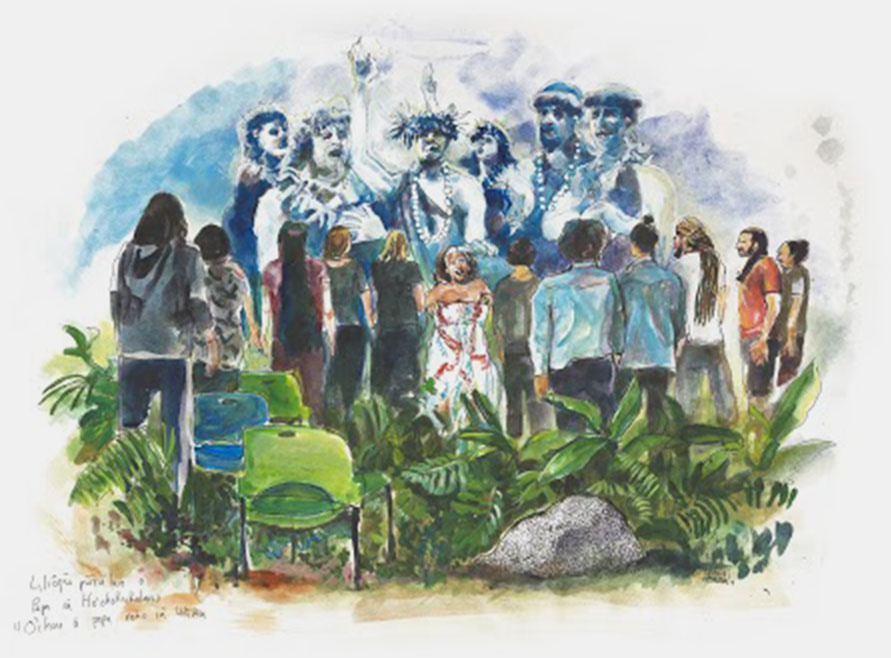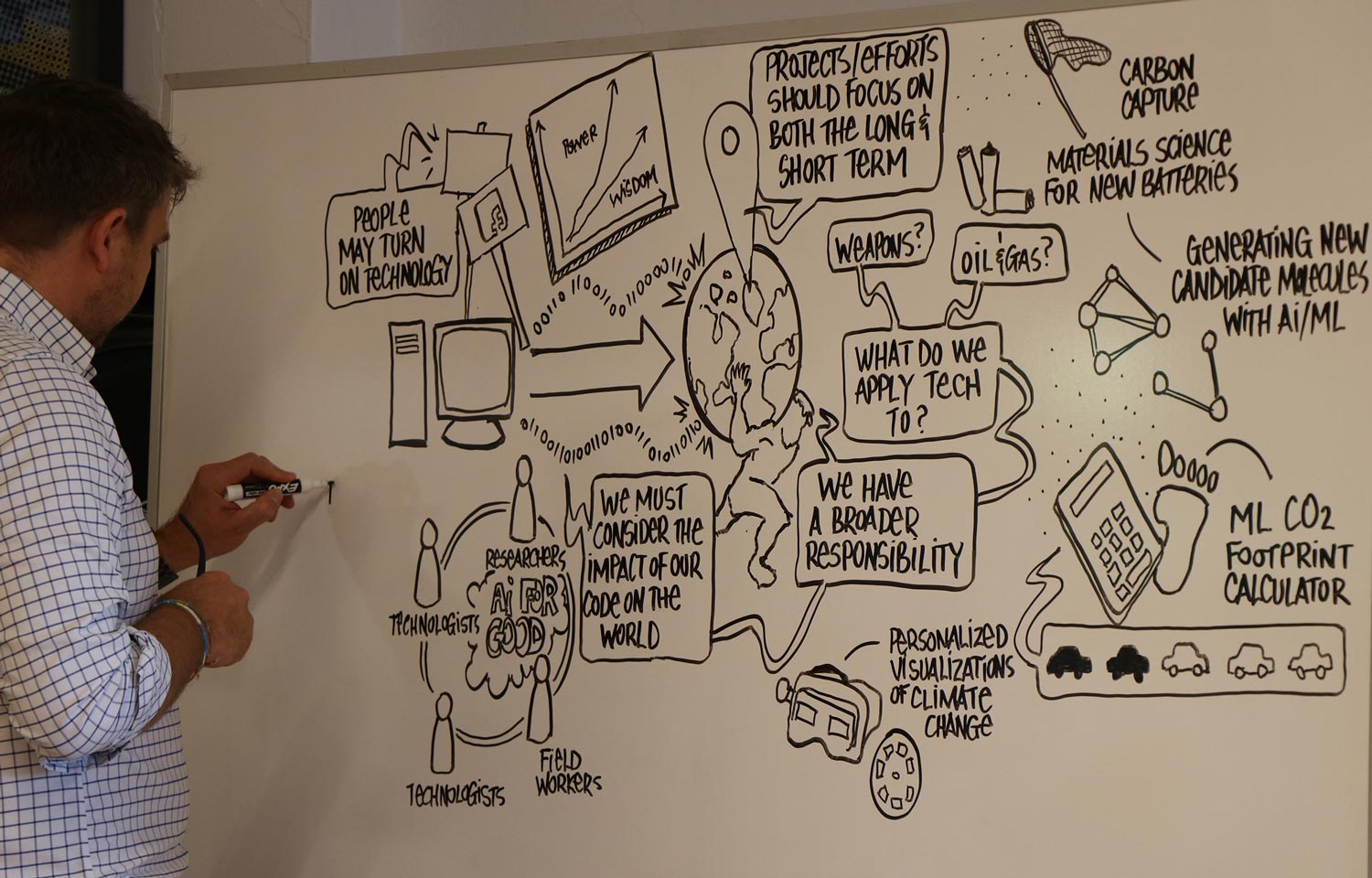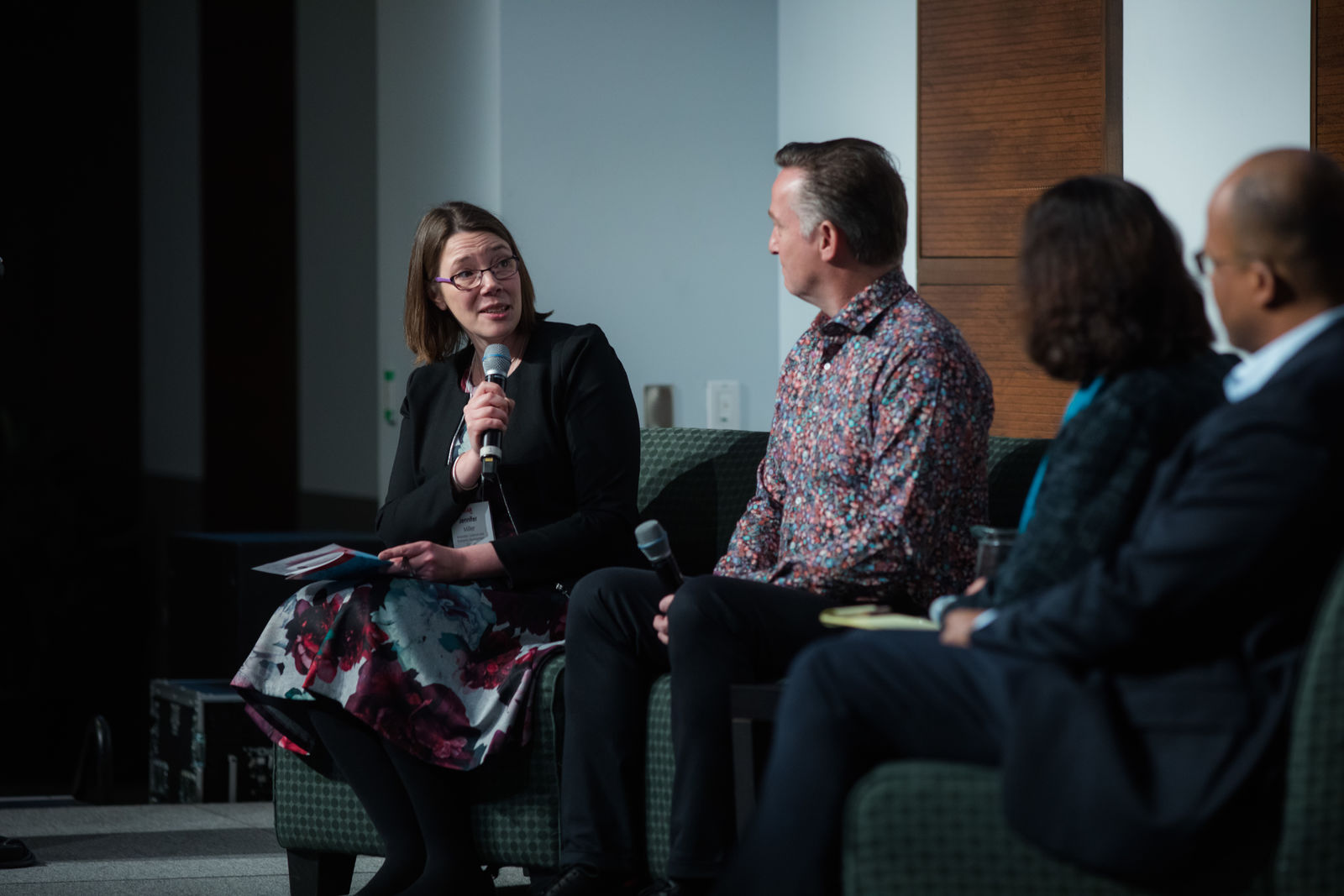AI & Society Workshops
UNDERSTANDING THE ROLE OF AI
Workshops generate a deeper understanding of how AI impacts health, security, and culture.
CIFAR’s AI & Society workshops bring together diverse experts from across disciplines, sectors and borders to address some of the most fundamental challenges posed by AI.
The workshops have explored topics related to ethical medicine in AI, the use of AI to address the climate crisis, and the role of AI as an amplifier of inequality for vulnerable populations.
Two calls for proposals for international AI & Society workshops were initiated in 2018.




March 2018 – October 2018
AI & Society Workshops: Call One
The first international call was completed in October 2018 and resulted in four successful applications. Each of the workshops brought together a diverse group of 20-25 international experts that explored issues of international significance.
Indigenous Protocol & AI
Mar. 1-2, 2019 | Honolulu, United States
May 26-June 1, 2019 | Honolulu, United States
How do we broaden discussions about the role of technology in society, and how can these conversations be informed by Indigenous knowledge and culture? These workshops brought Indigenous ways of making and maintaining relationships with human and non-human kin to bear on the question of how to build ethical relationships with AI.
Leadership Team: Jason Edward Lewis, Concordia University, Canada; Angie Abdilla, Old Ways. New. Indigenous Knowledge Consulting, Australia; ʻŌiwi Parker Jones, Oxford University, United Kingdom; Fox Harrell, MIT, United States
Workshop Outcomes: The workshop team published a position paper on Indigenous Protocol and artificial intelligence. The paper is a starting place for those who want to design and create AI from an ethical position that centers Indigenous concerns.
Generation AI: Establishing Global Standards for Children and AI
May 6-7, 2019 | San Francisco, United States
Though children comprise one-third of the world’s internet users, online algorithms have not been constructed to consider this especially vulnerable population, particularly those exposed to high levels of poverty and inequality. These workshops focus on AI as a potential amplifier of inequality, and inform a research policy and communication agenda that will bring these issues to the forefront of scientific, policy, legal, and public discussions.
Leadership Team: Candice Odgers, University of California Irvine, United States; Anna Goldenberg, University of Toronto, Canada; Ronald Dahl, University of California Berkeley, United States; Mizuko Ito, University of California Irvine, United States
Workshop Outcomes: Panicking about your kids’ phones? New research says don’t (The New York Times)
Generation AI: Wearables, Mental Health and Child Development
Oct. 15-16, 2019 | Toronto, Canada
The increasing use of digital technology in adolescence is occurring at a time in their development when teens are experiencing changes in social motivation and sensitivity to social evaluation and belonging. While technology can exacerbate risks of social isolation, exclusion or bullying, it also presents an opportunity to promote positive social and emotional experiences. Investment in the research, development and application of online algorithms, tools and platforms that focus on technology use during this period of life can lead to positive population health outcomes, and mitigate the potential for growing inequalities between different sociodemographic groups.
Leadership Team: Candice Odgers, University of California Irvine, United States; Anna Goldenberg, University of Toronto, Canada; Ronald Dahl, University of California Berkeley, United States; Mizuko Ito, University of California Irvine, United States
Workshop Brief:
AI-Powered Information Ecosystems & Democracy
June 27-28, 2019 | Montreal, Canada
The potential risks AI poses to democratic institutions are not well understood, in part due to the tension between potential benefits and harms to society. This workshop encourages collaborations between those developing tools and those with expertise in policy, civil rights, and democratic values.
Leadership Team: Derek A. S. Ruths, McGill University, Canada; Seda Guerses, University of Leuven, Belgium; Alexandra Olteanu, Microsoft Research, United States; Joris Hoboken, Vrije Universiteit Brussels and University of Amsterdam, The Netherlands
Workshop Brief:
Regulation of Defense and Security AI Technologies: Options Beyond Traditional Arms Control
July 15-16, 2019 | Toronto, Canada
Jan. 30-31, 2020 | Santa Monica, United States
Debates about AI arms control have focused predominantly on autonomous weapons systems. The workshops brought together AI technologists, arms control practitioners and researchers, and other experts in regulatory and control regimes to develop a better understanding of arms control in the age of&nbp;AI.
Leadership Team: Kerstin Vignard, UN Institute for Disarmament Research (UNIDIR), Switzerland; David Danks, Carnegie Mellon University, United States; Amb (ret.) Paul Meyer, Simon Fraser University, Canada; Giacomo Persi Paoli, UNIDIR,&nbp;Switzerland
Workshop Brief:
Workshop Outcomes: Modernizing Arms&nbp;Control
June 2019 – June 2021
AI & Society Workshops: Call Two
In August 2018, CIFAR launched an international call for proposals in partnership with the French National Centre for Scientific Research (CNRS) and U.K. Research and Innovation (UKRI). The partnership funded six proposals led by experts in Canada, France and the U.K. on important societal questions arising from AI. These proposals addressed topics such as trust in AI systems, the impact of algorithms and digital recommendation systems on culture, and, fairness, interpretability, and privacy for algorithmic systems.
Fairness, Interpretability & Privacy for Algorithmic Systems
June 3-4, 2019 | London, United Kingdom
Addressing themes of AI safety and privacy, this workshop investigated how algorithms in consumer services can be ethically and safely deployed. The research agenda was informed by the perspectives of lawyers, ethicists, and technology experts, and transcends national and disciplinary boundaries.
Leadership Team: Adrian Weller, The Alan Turing Institute, United Kingdom; Nozha Boujemaa, INRIA, France; Jonathan Schaeffer, University of Alberta, Canada
Sustainability in the Digital Age
Sept. 18-20, 2019 | Montreal, Canada
At the intersection of technology, sustainability, and policy, there is tremendous potential to identify levers of systemic change to lead society down a globally sustainable path. This workshop aimed to identify opportunities where powerful AI technologies can be applied to target climate change while understanding the ethical implications of these AI levers and the connections that define global systems of production, consumption, and organization.
Leadership Team: Amy Luers, FutureEarth, Canada; Mathilde Mougeot, École Nationale Supérieure d’Informatique pour l’Industrie et l'Entreprise (ENSIIE), France; Lyse Langlois, Université Laval, Canada; Sana Khareghani, Office for Artificial Intelligence UK, United Kingdom
Workshop Brief: (PDF)
Workshop Outcomes:
Ethical Futures & AI Medicine
Sept. 25-26, 2019 | Coventry, United Kingdom
As AI technologies gain wider adoption in the healthcare sector, greater consideration must be given to the ethical and societal implications of how the work of doctors will be disrupted. This workshop investigates how AI assistance may affect our understanding of the practice of medicine, particularly the impact of AI on core professional values, the professional roles of doctors, and the future of healthcare services.
Leadership Team: Heather Draper, University of Warwick, United Kingdom; Lisa Schwartz, McMaster University, Canada; Daniel Racoceanu, Sorbonne University, France; Wendy Rogers, Macquarie University, Australia
Workshop Brief: (PDF)
AI, Recommendations & the Curation of Culture
Oct. 4-5, 2019 | Paris, France
Cultural goods worldwide are now distributed algorithmically through digital recommendation systems, but the impact this has on how society consumes and produces cultural goods — such as music, film, and books — is unclear. This workshop addresses how the application of these algorithms to consumer services affects how society will curate, create and consume these goods, and how policies might influence this technology on an international scale.
Leadership Team: Ashton Anderson, University of Toronto, Canada; Georgina Born, Oxford University, United Kingdom; Fernando Diaz, Microsoft Research, Canada; Jeremy Morris, University of Wisconsin-Madison, United States
Workshop Brief: (PDF)
Rethinking Cultural & Ethical Issues in AI
Oct. 28, 2019 | Paris, France
Given the effect of AI and other technologies on social dynamics and human interactions, this workshop investigates how the development of AI affects cultural diversity and expression, the nature of AI’s impact on ethnic, gender, and socio-cultural discrimination, and potential governance options to preserve diversity and human rights.
Leadership Team: Marie-Hélène Parizeau, Université Laval, Canada; Vanessa Nurock, Université de Paris 8, France; Raja Chatila, Université Sorbonne, France; Véronique Guèvremont, Université Laval, Canada
AI & Health Care: A Workshop For the Fusion of Law & Science
Part 1: Oct. 9, 2020 | Virtual
Part 2: Feb. 26, 2021 | Virtual
A workshop for the fusion of law and science: Current legal and regulatory medical regimes — protecting patient safety and privacy — were developed in an era of medicine that is rapidly falling out of memory. The workshop explored existing safety and privacy laws surrounding AI health technologies from ethical, legal, and regulatory perspectives.
Leadership Team: Colleen Flood, University of Ottawa, Canada; Ian Kerr (until 2019), University of Ottawa, Canada; Joelle Pineau, McGill University, Canada; Céline Castets-Renard, Université Toulouse Capitole, France
Workshop Outcomes:


INTERNATIONAL COOPERATION
Exploring the unique opportunities and challenges of AI-supported technologies.
The Canada-U.S. AI Symposium on Economic Innovation brought together Canadian and American experts to explore innovative approaches to public policy. Discussions focused on how AI strategies could promote economic growth while mitigating potential societal risks. The symposium was developed in partnership with Innovation, Science and Economic Development Canada and the U.S. Consul General in Toronto.